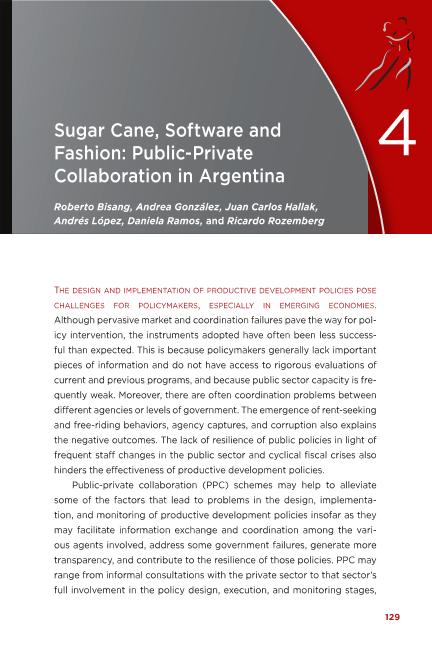Capítulo de Libro
Sugar Cane, Software and Fashion: Public-Private Collaboration in Argentina
Título del libro: Two to Tango: Public-Private Collaboration for Productive Development Policies
Bisang, Roberto Oscar; Gonzalez, Andrea; Hallak, Juan Carlos ; Lopez, Andres Flavio
; Lopez, Andres Flavio ; Ramos, Daniela; Rozemberg, Ricardo Daniel
; Ramos, Daniela; Rozemberg, Ricardo Daniel
 ; Lopez, Andres Flavio
; Lopez, Andres Flavio ; Ramos, Daniela; Rozemberg, Ricardo Daniel
; Ramos, Daniela; Rozemberg, Ricardo Daniel
Fecha de publicación:
2016
Editorial:
Inter-American Development Bank
ISBN:
978-1-59782-259-6
Idioma:
Inglés
Clasificación temática:
Resumen
The design and implementation of productive development policies (PDPs) pose challenges for policymakers, especially in emerging economies. Although the existence of pervasive market and coordination failures pave the way for policy intervention, adopted instruments have often been less successful than expected, since policymakers usually lack important pieces of information, they generally do not have access to rigorous evaluations of current and former programs and State capabilities are frequently weak. Moreover, coordination problems between different agencies and/or levels of government often exist. The emergence of rent seeking and free riding behaviours, agency captures and corruption episodes are other factors that explain the abovementioned outcome. The lack of resilience of public policies in the light of frequent staff changes in the State bureaucracy also hinders PDPs effectiveness.Public-Private Collaboration Schemes (PPCs) may help to alleviate some of the factors that lead to problems in the design, implementation and monitoring of PDPs, insofar they may facilitate information exchange and coordination among the different agents involved, address some government failures, generate more transparency and contribute to the resilience of those policies. PPC may range from informal consultations with the private sector to the full involvement of the latter in the policy design, execution and monitoring stages, including schemes such as the participation of the private sector in advisory and supervisory bodies, technological and productive alliances, deliberation councils, etc.The evidence gathered from the case studies will allow us to highlight common factors that may lead to the success (or failure) of PPCS, as well as idiosyncratic features related to the objectives, actors and/or specific arrangements adopted in each case. The result of this analysis is presented in the final section, where we distil lessons that may be applied to other sectors/regions in order to a better diffusion and effectiveness of PPC schemes.
Palabras clave:
POLITICAS DE DESARROLLO PRODUCTIVO
,
ALIANZAS PUBLICO PRIVADAS
Archivos asociados
Licencia
Identificadores
Colecciones
Capítulos de libros(SEDE CENTRAL)
Capítulos de libros de SEDE CENTRAL
Capítulos de libros de SEDE CENTRAL
Citación
Bisang, Roberto Oscar; Gonzalez, Andrea; Hallak, Juan Carlos; Lopez, Andres Flavio; Ramos, Daniela; et al.; Sugar Cane, Software and Fashion: Public-Private Collaboration in Argentina; Inter-American Development Bank; 2016; 129-188
Compartir



